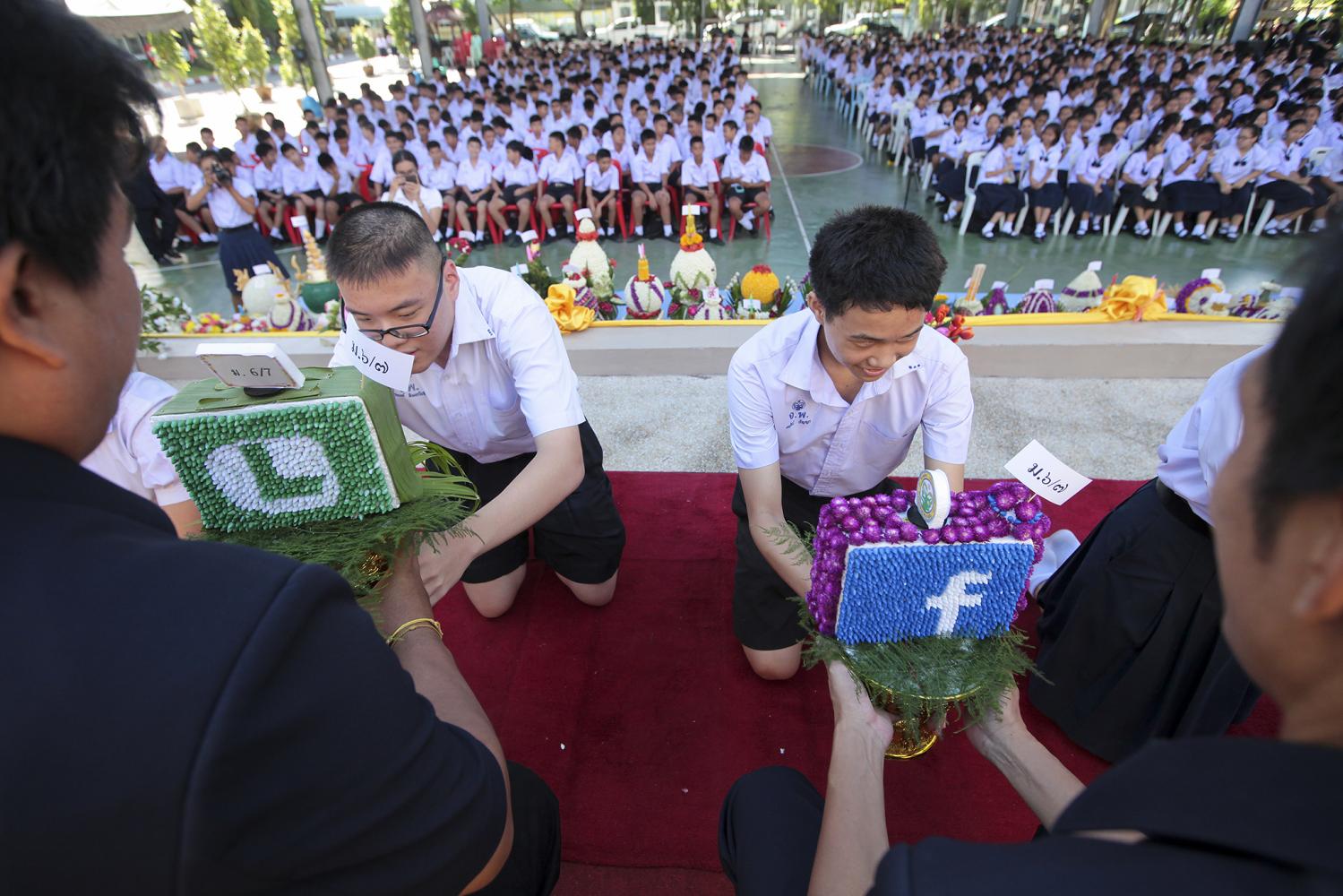
The notification was in my inbox a few weeks ago that our faculty would not hold a Teachers' Day ceremony or wai khru, a ceremony to pay homage to teachers, this year. The students had the option to join the university's main ceremony or they could just get on with their lives on that particular Thursday.
September is the month of Wai Khru Day at many educational institutions in Thailand. The tradition of wai khru is widely observed in countries around Southeast Asia such as Myanmar, Cambodia, Laos and Thailand. It is customary to see the teachers seated on a stage, with the students bowing down or prostrating themselves before their teachers' feet. Elaborate floral arrangements are also presented.
Thai culture values visual and physical demonstrations of sacredness, and is a culture of hierarchy and knowing your place. Thais believe that this ceremony is a way to show gratitude and pay respect to their teachers. Teachers are literally placed above others in this ceremony. Naturally, it endorses the notion that anoints teachers as higher beings, and the students as lower ones. According to Thailand's Ministry of Education, the early development of Thai education was largely restricted to the royals and the highborn, particularly males, conducted either in the royal court or at the temple. The teaching was mostly performed by monks and concerned with moral, intellectual and cultural topics, devoid of real-world applications.
So that explains the ceremony and symbolism. But wait! Is this tradition appropriate or does it even deserve to exist in this day and age when our students have adopted nothing short of scepticism? Sensible, modern-day teachers would expect their students to pay them respect by paying attention in class, turning in assignments when due and maintaining academic integrity. Pretty reasonable gestures if you asked me.
We get it, human beings are creatures of habit who find it difficult to change. We often fail to challenge assumptions and question traditions. Are teachers dedicated to spending their precious time imparting vital knowledge to students, or just doing their paid jobs? The wai khru tradition, like most habits of thought and behaviour, is so much a part of the tradition around being a Thai teacher, that they fail to consider whether it remains appropriate or even justifiable.
I almost thought of myself as a traitor to criticise this gentle, respectful wai khru tradition as I am both Thai and a teacher. But from an outside-in perspective, wai khru can be viewed archaic in the modern world's eye. So I'm proposing that wai khru get a facelift. In Singapore, primary and secondary students gather to show appreciation towards their teachers. The same goes in Malaysia, where students can give flowers to their teachers if they want to. The flowers say "Hey, have a good day!". Teacher's Day means that teachers can have a day off to stay home, watch football, have a mani-pedi session or giggle with friends.
Not to draw on stereotypes, but Japanese society is known to be heavily culture-bound and unmistakably hierarchical, as seen in their ritual observances. I initially imagined their Teachers' Day to involve a certain degree of unfathomable formality. But how wrong I was!
A Japanese graduate student at Thammasat University, Hiroshi Hasegawa san, told me that in Japan, the notion of "occupational equality" is widespread among the Japanese people and every job earns respect as long as it contributes to society regardless of occupation. Therefore, there is no discrimination or bias based on occupation, and teaching is not a special job for Japanese people. In reality, the workers who earn respect are those that work hard. Hiroshi added that if there was a "Teachers' Day" then there should be "Policemen's Day", "Postmen's Day", "Taxi Drivers' Day" and so on. Well, that makes perfect sense!
The conflict between the traditional hierarchy and a more forward-thinking egalitarian philosophy is actually a battle between two different philosophical opinions. They come from different places and they go in different directions. The wai khru tradition condones and reinforces the hierarchical edifice and bureaucracy in education. Hierarchical protocols are in direct opposition to the necessary education objectives of critical thinking, that are essential for future generations.
The world of education is never static, rather, it's progressive and dynamic. Hierarchical traditions reflect prestige and breed control and order. But when teachers and students are equals, we see trust in the future and have a better chance at cultivating meritocracy. In fact, lately, many Thai institutions have not been shy about treating Teachers' Day casually. The Faculty of Learning Sciences and Education at Thammasat University had on their Facebook page a student-led fun day filled with music and gift giving -- no bowing or a floral tray in sight. The devotional reverence of wai khru rituals is best left with the spectacular martial arts (kickboxing) and gracious cultural performing arts. Even an angry cynic like me enjoys it from time to time.
Higher education institutions do not need this complex ritual that ranks people according to levels of importance. Let's just forget this archaic tradition altogether, even if you, teachers, feel belittled because your pride cannot bear the irrelevance. We should use this opportunity to give students grants and rewards or have a performance that teachers and students can all enjoy and become, you know, equal.
Pattamawan Jimarkon Zilli is an assistant professor at the Department of English and Linguistics, Faculty of Liberal Arts, Thammasat University.